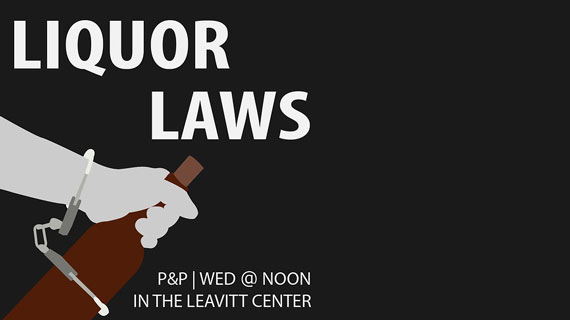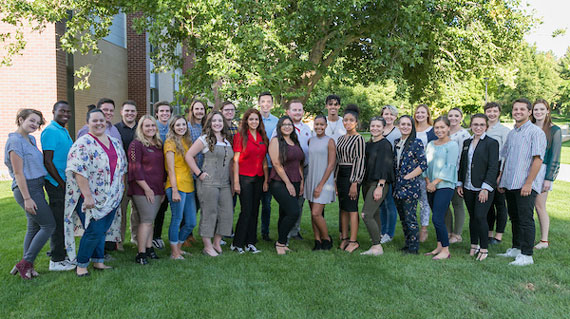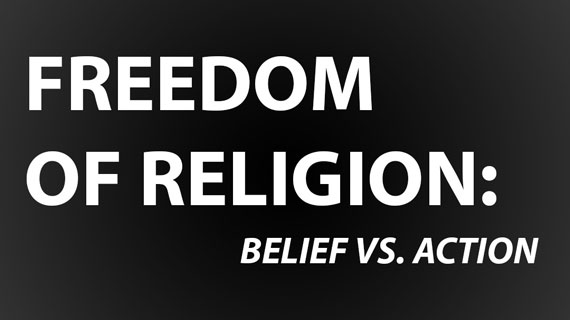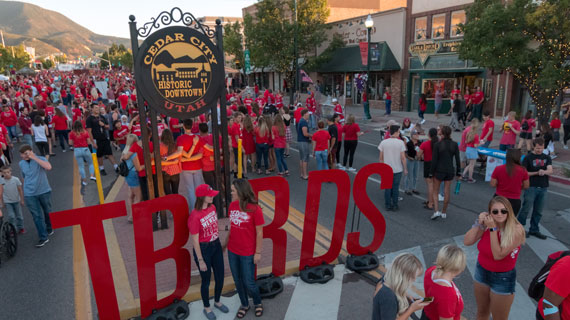Pizza and Politics Focuses on Liquor Laws
Posted: April 27, 2018 | Author: Miles Anderson | Read Time: 5 minutes
 The Michael O. Leavitt Center for Politics and Public Service hosts Pizza & Politics every Wednesday at noon to discuss a current political topic. Leavitt Center student employees research the topic and moderate the conversation. These discussions expose students to a variety of important issues and encourages them to share their own perspectives while learning all sides of an issue. Free pizza is provided for all who attend.
The Michael O. Leavitt Center for Politics and Public Service hosts Pizza & Politics every Wednesday at noon to discuss a current political topic. Leavitt Center student employees research the topic and moderate the conversation. These discussions expose students to a variety of important issues and encourages them to share their own perspectives while learning all sides of an issue. Free pizza is provided for all who attend.
Utah has a reputation of having some of the strictest liquor laws in the United States. From the Zion curtain to the record-low BAC required for a DUI, the laws both new and old receive criticism and praise from various parties. Evan Miller, a sophomore psychology major, and Serena Woodhouse, a junior philosophy major, moderated the discussion regarding Utah’s liquor laws.
To begin, some information was provided pertaining to which liquor laws are controlled by the states and which laws are controlled by the federal government.
How should liquor laws be regulated?
The majority of responses to this question favored the current system which splits regulatory responsibility between the state and federal government and ultimately leaves most liquor laws up to the states with the exception of things like the legal age of drinking and some other general guidelines. There were a couple of people who wanted the federal government to have nothing to do with the drinking age and thought regulations should come solely from the states. There was also a group of people who don’t think there should be any regulations from anyone and citizens should be able to drink whatever they want whenever they want.
Taking effect on December 30, 2018, Utah will start enforcing a max blood alcohol limit for drivers to .05%, making it the strictest drunk driving law in the nation. The unofficial standard accepted in most states is .08%.
Will Utah’s .05% BAC deter drunk drivers?
Mixed responses resulted from this question. One of the first things pointed out by an audience member was the variety of factors that contribute to drunk driving deaths in each state, claiming we can’t look solely at the statistics. This was in response to the provided information that Utah is arguably the strictest state for alcohol consumption and sale and has the lowest drunk driving rate in the country besides Alaska. The argument was that the number of people who drink in Utah is much lower than in other places so the low number of drunk driving related deaths may be misleading.
Most of the other comments indicated that the lower BAC maximum would deter drunk drivers. While strict laws may negatively impact the economy in some way, it seems like common sense that the laws would make people think twice about driving after drinking any amount of alcohol.
Alcohol retail laws in Utah are often viewed as a deterrent to businesses opening establishments in Utah. Some of these retail laws include: the requirement to order food with your drink at a licensed restaurant, a restaurant must maintain at least 70% of its revenue from food, bars cannot be open between 1am-10am, and liquor sold by the state must be marked up by at least 88% above case cost.
Would more research into the economic impacts of Utah liquor laws be beneficial?
Audience members all seemed to agree that research into this matter would be a good thing. However, several comments indicated that such research would be very difficult to conduct as there is no other state exactly like Utah. It was argued that while alcohol laws may deter some businesses, it may promote growth in other areas. Utah is growing rapidly despite these laws, almost faster than the state can handle, and it is possible that the growth is coming partially due to people searching for an alcohol-free environment.
Others disagreed and stated that Utah is missing out on massive amounts of revenue from alcohol sales in areas surrounding state and national parks and from restaurants and bars who refuse to build here. In either case, it would be beneficial to find out what economic impact strict liquor laws have on the state.
Utah has some unique rules for restaurants serving alcohol. Previous legislation required a 7-foot high barrier designed to hide bars from children. It was nicknamed the “Zion Curtain”. This law was replaced in July of 2017 with a liquor reform law requiring restaurants to seat those under 21 at least 10 feet from the bar or at least 5 feet from a bar if there is a half-wall or other structure about 3.5 feet tall. Examples of these types of establishments are Applebees and Chilis. These laws are often associated with the strong presence of the LDS church in the state legislature.
Do Utah liquor laws violate the establishment clause of the First Amendment as defined by the Lemon Test?
The Lemon test requires a law to meet all three of the following prongs: the law must have a secular legislative purpose, the principal or primary effect cannot advance or inhibit religion, and it must not foster an excessive entanglement with religion.
Many audience members expressed that they felt the LDS church had too much of an influence on the Utah legislature and something should be done about it. Others believed that the LDS church is well within its rights to lobby for laws that align with the moral values of their religion and legislators who are members of that church are well within their rights to vote according to their moral values.
As far as the question itself is concerned, those familiar with the Lemon test explained that liquor laws very clearly pass all three prongs of the test. The secular legislative purpose is to stop drunk driving accidents and discourage alcoholism, the primary effect of the laws does nothing to advance religion in any sort of inappropriate way, and does nothing to foster excessive entanglement between government and religion. While the influence of the LDS church is significant, it is not in violation of the Constitution.
This article was published more than 3 years ago and might contain outdated information or broken links. As a result, its accuracy cannot be guaranteed.
Tags: Student Blog Leavitt Center




